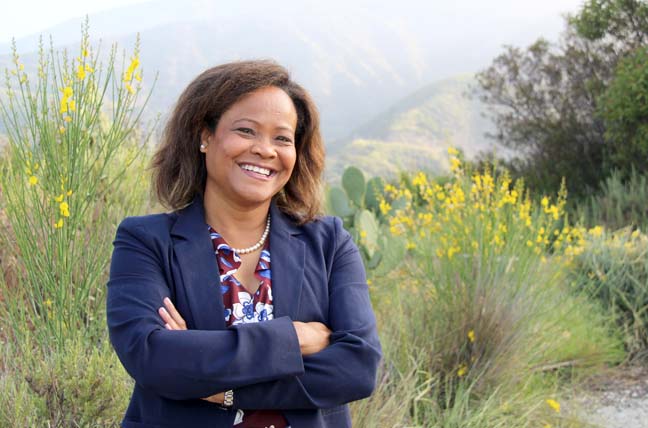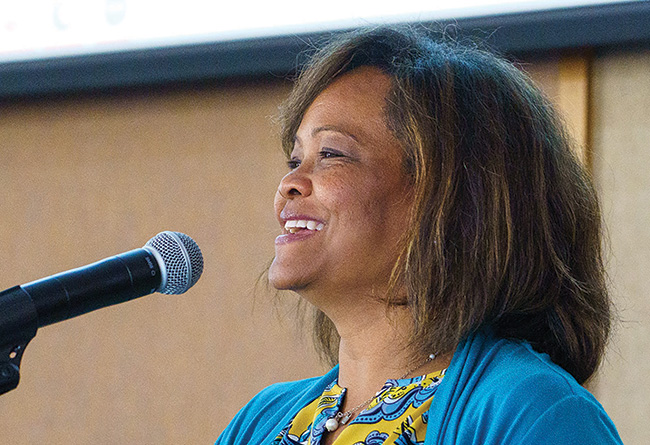Assembly candidate Felicia Williams aims to be ‘a thoughtful Democrat’

Pasadena native Felicia Williams is one of three candidates vying to replace Chris Holden representing California’s 41st Assembly District, which includes Claremont. Photo/by Jennifer Hall Lee
by Steven Felschundneff | steven@claremont-courier.com
California State Assembly candidate Felicia Williams wants every voter to know she is a contemplative person who, if elected, will look objectively at every bill before making a decision.
“Some people define themselves as progressive or conservative,” she said in a recent interview. “I am not into names, but I am a very thoughtful Democrat. I will look at all sides and listen to all different opinions and craft legislation because that is democracy. I am here to represent everyone.”
She is running to represent the 41st Assembly District, which includes Claremont, Williams’ hometown of Pasadena, the foothill communities and portions of the high desert against fellow Pasadena resident Phlunté Riddle and Claremont City Council member Jed Leano.

Felicia Williams speaks at a recent Rotary Club of Claremont meeting. Courier photo/Peter Weinberger
Williams was born and raised in Pasadena by a Filipino immigrant mother and Black father. Her parents met while in graduate school at USC. They made education a priority. Williams, who attended the prestigious Polytechnic School in Pasadena. She earned a bachelor’s degree in public policy at Stanford, a master’s in urban planning from UCLA, and an MBA in finance from the University of Michigan.
Her father was involved in the Civil Rights movement in the South before moving to California where he became one of California’s first Black pharmacists. Her mother was also a pharmacist who opened a real estate business when Williams was a child. She describes her father as being more socially progressive while her mother is more fiscally conservative, which led to many spirited conversations in their home.
“So I grew up with two very different views in my household, but we learned to agree to disagree, and I think that is one of the things we have lost a little bit in our society,” she said. “But it’s something I take to heart, because as an elected official, I need to listen to everybody whether they look like me or agree with me, it doesn’t matter.”
Williams currently represents District 2 on the Pasadena City Council and serves as the city’s vice mayor. Before her election to the council in 2020 she served for 10 years on commissions in Pasadena, including a stint as the chair of the planning commission. She serves on the board of directors for a number of local agencies, including Planned Parenthood for Pasadena and San Gabriel Valley, Foothill Transit, Pasadena Educational Foundation, and the Pasadena Police Foundation.
“When I ran for city council my slogan was ‘experience counts,’ and that’s exactly what I do. I use my experience to help make thoughtful decisions that will be best for the community,” Williams said. “That’s always what I look at, what is best for the community.”
Williams started her professional career structuring real estate transactions for cities. After earning her MBA she moved to New York in 2000 where she was an investment banker for Goldman Sachs. She was in Manhattan the morning of September 11, 2001, just a few blocks from ground zero. Her boyfriend was in the World Trade Center and did not survive.
“It was a very difficult time, but it reminds you why you are alive,” she said. “It reminds you why we do what we do. It also reminds you that work isn’t everything and that you should go spend time with the people you love while you still have them.”
She eventfully moved back to California, where she switched from corporate bonds to municipal bonds and later worked for Southern California Edison where she traded and hedged natural gas. She currently works as a financial consultant for cities and other agencies and says her clients include several towns in the 41st District.
Williams said her experience in finance makes for a perfect background for serving in the assembly because she is well versed in getting big projects completed. She cites three affordable housing projects currently in the works, two of which are under construction and include 1,975 new housing units, of which 700 are affordable.
“We just went into a partnership with Kathryn Barger to purchase an old Kaiser health clinic and we are going to turn that into an outpatient mental health [facility]. This is really critical,” Williams said. “It’s a big component of reducing homelessness [and] it’s a big component of addressing mental health.”
She would like to be part of an ongoing effort to amend the Lanterman-Petris-Short Act which was passed in 1967 in part to “end the inappropriate, indefinite, and involuntary commitment of persons with mental health disorders.”
“Currently in the state someone is defined as mentally ill if they are a harm to themselves or others,” Williams said. “A close relative is mentally ill [and] we have been dealing with this for 30 years and it’s very difficult to get him outpatient mental health care. We need to amend the act to define someone as mentally ill if they cannot take care of themselves and what that will do is it will allow a judge to compel them into services.”
If elected, Williams promises to champion local control over the big projects that affect the cities and jurisdictions in the district. This includes affordable housing developments like Larkin Place.
“My understanding of Larkin Place is it’s not that the neighbors are against it, I think they believe in permanent supportive housing, [the objections are] one, it’s the location, two, it’s the density and the size, and three, was the limited community outreach,” Williams said.
“So I am not into calling people NIMBYs or YIMBYs, sort of dividing people up. They are all people who care about our community, and I firmly believe that with community outreach projects are made better. But what the state has done is overridden the local ability to have community outreach to make better projects.”
Before taking office on the Pasadena City Council Williams was criticized for switching her party affiliation from Democrat to no party preference. These critics, as outlined in a story in LA Progressive, have questioned her commitment to the party’s core principles.
“I have been registered as a Democrat my whole life,” Williams said. “When I took elected office as a non-partisan elected official, I read the state constitution, which said we are supposed to be non-partisan and I switched my party to no party preference.”
Her voting record is public information, she added. “I have a track record not only of leadership but also of creative legislation to address problems,” she said.
“One of my opponents is fighting for social justice, another of my opponents is fighting for affordable housing, and I am fighting for the economy, because without good jobs and benefits you can’t achieve either.
“The road to social justice is through economic justice. The way to afford housing is by bringing people into a job and a career where they can support their housing and support their family.”
More information on Williams’ candidacy is at feliciawilliamsforassembly.com.
This is the final Courier profile on the three 41st Assembly District candidates, all of whom are registered Democrats. If an additional candidate throws a hat into the ring over the coming months we will profile that person as well.









0 Comments